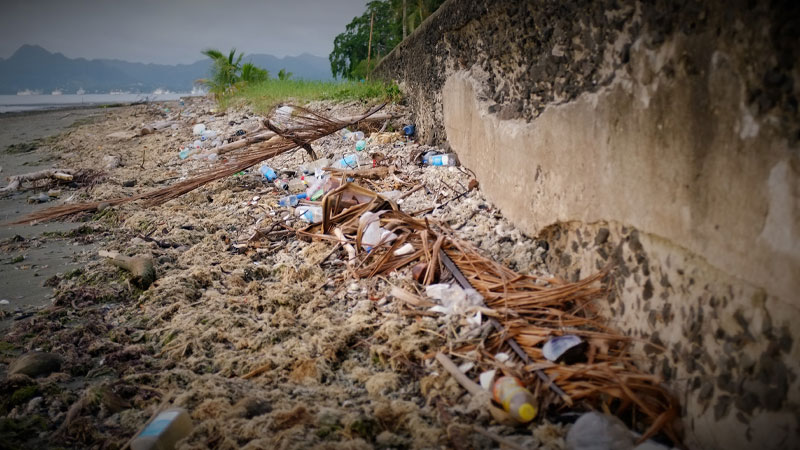
68% of fish in the Suva Coastal Area had some form of microplastic in them according to research done by USP Postgraduate Researcher Andrew Paris.
Paris says one of the main issues in Fiji is littering and it is shameful how this is being done.
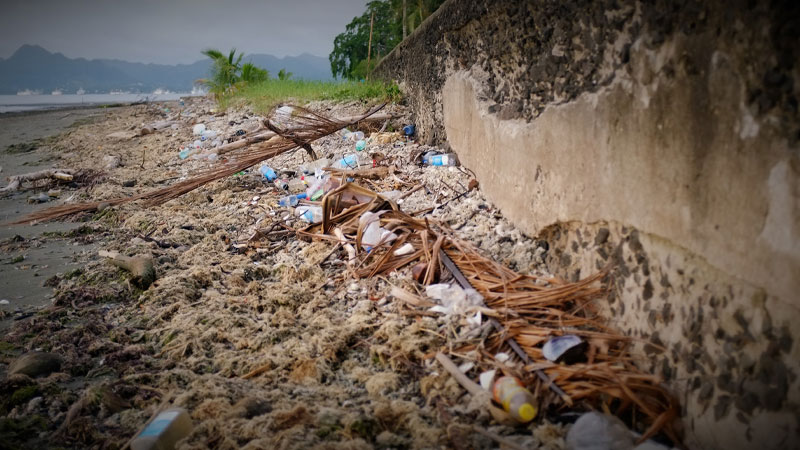
68% of fish in the Suva Coastal Area had some form of microplastic in them according to research done by USP Postgraduate Researcher Andrew Paris.
Paris says one of the main issues in Fiji is littering and it is shameful how this is being done.
He says in 2015 it was found that Fiji and Vanuatu contributed about 1% to plastic pollution in the world and 90% of microplastic is from the land which enters waterways and rivers that ended up in the ocean.
Paris also highlighted that from their research in 2018, an average of 5.5% of microplastic was found in fish in Laucala Bay, Suva Harbour and Rewa River.
He adds that one of the main sources of microplastic in the Suva Coastal Area is the Kinoya Sewerage Treatment Plant.
He says some of the microplastic that is mostly found in the Suva Coastal area are polyethene, polypropylene, PET bottles, polystyrene, latex, nylon and flip flops.
Paris stressed that some solutions they have come up with are the adoption of the recycle, reuse and reduce rules and policies should be implemented on waste management and recycling.
24 million tonnes of microplastic is being dumped in the ocean every year.
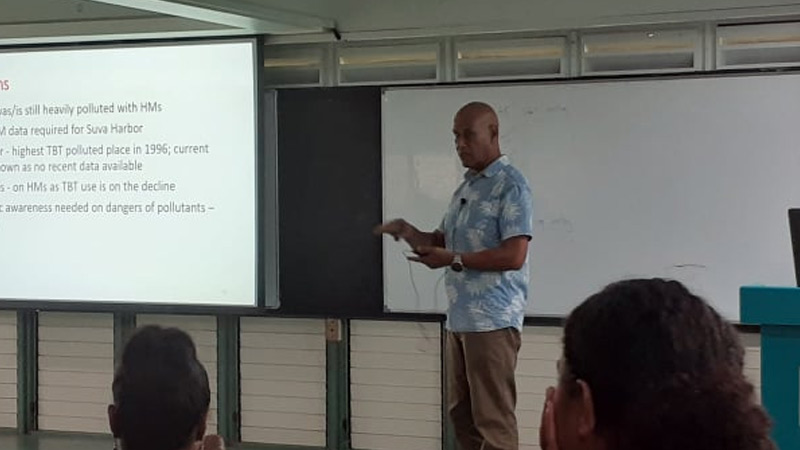
There has been an increase in the amount of heavy metal such as lead, copper and zinc in the sediments of the Suva foreshore area according to research conducted in 2018.
This has been revealed by Doctor Matakite Maata of the University of the South Pacific’s School of Biological and Chemical Sciences.
Doctor Maata says consumption of high levels of these metals can cause health problems, and people can even get cancer.
He says the closure of the Lami Rubbish Dump in 2014 led to a decrease in the amount of lead in the Suva foreshore area but it is still higher than acceptable levels and the levels of copper and zinc are still increasing.
Based on available data, heavy metal pollution will continue to rise if not curbed because of developments in the area and an increase in Suva’s population.
In a presentation during the Environmental Journalism Workshop at USP, it was revealed that 50 to 80 milligrams of lead was found in a kilogram of sediment in 2018 in Laucala Bay compared to 3.32 to 13.25 milligram per kilogram in 2001. The level present naturally in sediment is 14 mg per kg.
54 to 170mg per kg of copper was found in 2018 compared to 23.9 to 93.6mg per kg copper in 2001 while the 50mg per kg is present naturally in sediment.
15.5 to 157mg per kg of zinc was found in 2018 compared to 32 to 144mg per kg in 2001. 75mg per kg of zinc is naturally present in sediment.
Doctor Maata says the metals come from steel works, garages, slipway, marina, the Lami rubbish dump, battery factory, paint companies and rusty or junk vessels.
The researcher adds that Suva population increased by 5.7% in 2017 when compared to 2007.
He says recent data on levels of metal present in sediment is necessary and there is also a need to educate the public on the dangers of these pollutants.
The researcher also adds that more collaboration should be encouraged between researchers and the government where they can share data so that legislation and enforcement can be done by authorities to solve the pollution problems.
He has recommended that wastewater can be treated before discharging or have a soak pit, rusted and junk ships should ne removed from the harbor, waste can be collected from areas where ships are repaired and disposed off appropriately.
He adds that the management and disposal of solid waste and sewage should be looked at and civil society organisations such as PIANGO can also be engaged in lobbying authorities to address these pollution issues.
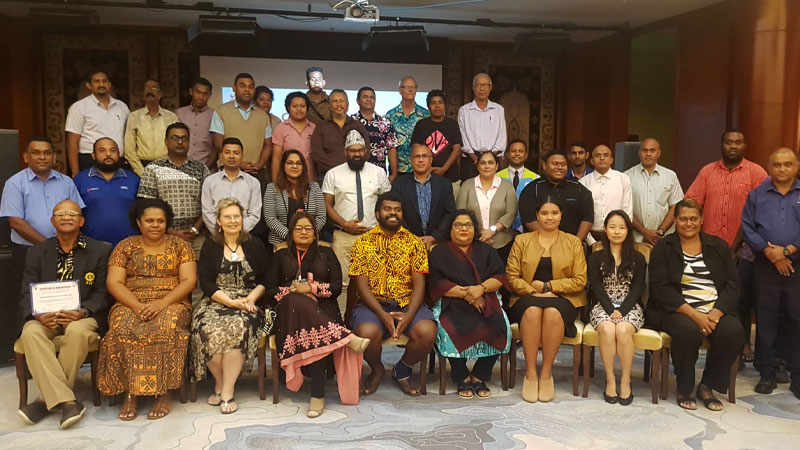
One of the challenges faced by all municipal councils in Fiji is finding ways or activities that will ensure that the environment is kept safe and clean.
While officiating at the Suva City Environment Volunteer Leader's Forum at Civic Centre, Suva City Council Special Administrator and Chairman, Isikeli Tikoduadua says one of the activities that will help the environment is a cleanup campaign which is a hard and expensive task and this cannot be done without volunteers.
Tikoduadua says it is a good thing when the media highlights the challenges faced by the municipal councils.
He says disposing of rubbish is one of the issues that contribute to the pollution of the environment and it is the parents' role to educate their children on this.
Tikoduadua adds that urbanisation also contributes to the pollution of the environment.
People have also been seen throwing rubbish from buses and cars without any thought or guilt.
Tikoduadua highlighted that whenever some children tell parents not to throw rubbish, they are being told off and this has been a challenge for them.
He also stressed that the issue of protecting the environment should also be taught in church.
30 volunteer organisations received certificates of appreciation awards for their contribution to keep Suva clean.
The organisations include JICA, Muanikau Community Post Committee, the Church of Jesus Christ of Latter-day Saints Suva, United Samabula North Youth Club, Consumer Council of Fiji, Ministry of iTaukei Affairs, USP Bua Students Association, Muslim League Zone 6, Muslim League Zone 7, Rifle Range Community Group, Vinod Patel Company Limited Fiji, South Pacific Community Project and the Lovoni Titans Rugby League club.
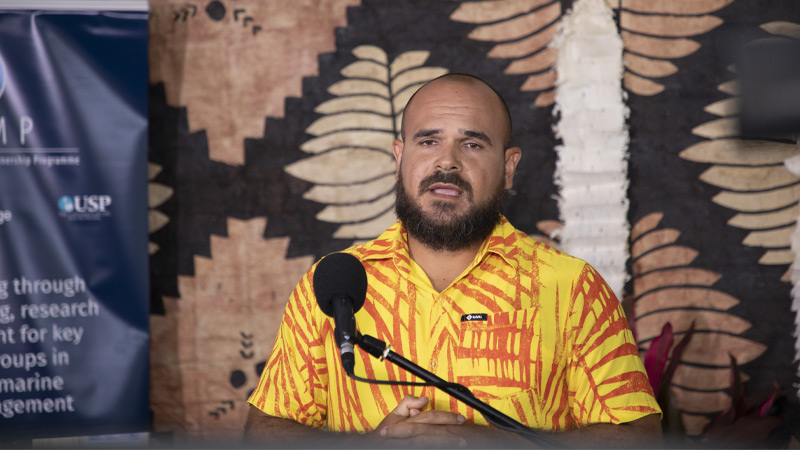
Suva has become one of the main hot spots for marine pollution in terms of the amount of microplastic in our waters, and researchers have now found high levels of microplastic in seafood from these areas.
This has been highlighted in USP’s virtual live event for the Pacific European Union Marine Partnership Programme Research, which was done by Andrew Paris.
Paris says microplastic is found in all the bodies of water in Fiji which is then ingested by sea life.
He adds this problem will have health risks when we consume the seafood.
Paris says through studies conducted in areas in Laucala Bay, Suva Harbour and in the Veisari region, they found that 66 percent of the fish had at least one microplastic in them.
Paris says the Suva inshore environment has the highest amount of Poly-ethylene - a chemical which is a major component to make plastic and is proven to be harmful to humans.
He says a constant source of microplastic is the Kinoya Wastewater Treatment Plant which flushes out water that contains micro fibre and strands of mircoplastic.
Paris says that as Pacific Islander, seafood is an important part of our diet yet microplastic which is ingested by fish pose health risks to humans.
USP’s Dean Of The Faculty of Science, Technology and Environment, Associate Professor Anjeela Jokhan says they hope that this research will be used to educate people on the dangers of plastic and the threat it poses to marine life and human beings.
She hopes policies can be made to help reduce this current problem of microplastic.
Stay tuned for the latest news on our radio stations


